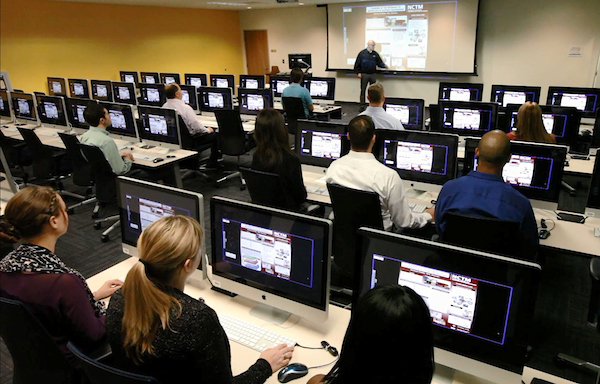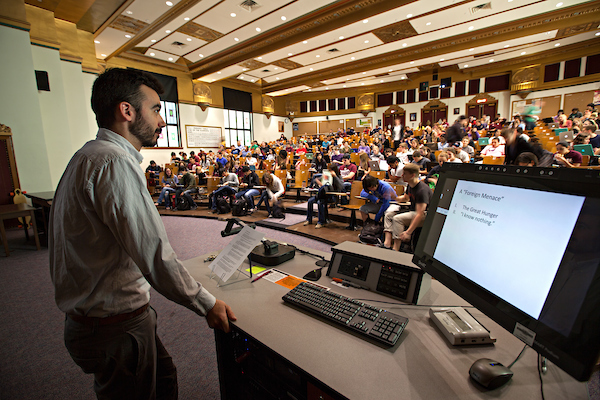-
1.1 Current faculty members who hold appointments are not required to change their current title to match these guidelines; however, at reappointment or hire titles should conform to these guidelines. Nothing in these guidelines supersedes the requirements for faculty recruitment, appointments, and promotions that are addressed in Texas A&M University System Policies or Regulations, or Texas A&M Rules and Standard Administrative Procedures. Information about promotion criteria and process are found in the Promotion & Tenure Guidelines released by Faculty Affairs annually. Information about procedures for notice of non-renewal or dismissal are found in University Rule 12.01.99.M1.
1.2 By definition, a position is considered to be a faculty appointment if the primary title includes the word “professor,” “instructor,” or “lecturer” in the title, regardless of other rank of appointment qualifiers associated with the title. However, not all faculty appointments are eligible to participate in all faculty shared governance activities, and must adhere to the Constitution and Bylaws of the Faculty Senate or other approved guidelines, including College/School and Department guidelines.
1.3 Exceptions to the below categories for faculty titles and the associated justification require approval by the Dean and the Vice Provost for Faculty Affairs.
-
Professor, Associate Professor, and Assistant Professor are appointment titles of either tenured or tenure-track faculty members. All tenured and tenure-track faculty members are expected to have a terminal degree appropriate for the field in which the faculty member will be primarily teaching. All faculty members in these appointments are expected to make significant contributions in the areas of scholarly research/ creative work, teaching, and service. Granting tenure is a recognition of excellence in all three areas and entitles the faculty member to continue in their academic position unless dismissed for good cause, and promotion is based on continuing accomplishment and national/international recognition for scholarship.
-
Academic Professional Track Faculty Titles. Academic Professional Track (APT) faculty titles are non-tenure accruing appointment titles offered for fixed terms, which can be renewed. Fixed terms can be offered at a maximum of three years at the entry level and a maximum of five years at ranks higher than the entry level. It is recommended that a faculty member complete three years of continuous service with satisfactory or higher performance before being considered for multiple year fixed term appointments.
Faculty members in these appointments provide a professional skill to the academic institution. All are expected to make significant contributions in at least one area of scholarly research/creative work, teaching, and service, and this can include work in applied or clinical settings. All faculty members are expected to be involved with the research, education, and service missions of the university, but would typically be assigned only one or two areas where they are expected to make a substantial contribution. In areas of substantial contribution, the effort allocation to each area should have above a 10% effort allocation and be included in faculty evaluations. Faculty can be assigned nominal contributions in addition to areas where they are expected to make substantial contribution [defined as contributions at or below 10% effort allocation and with expectations of effective, but not necessarily excellent, performance indicators].
Faculty members in these appointments are evaluated for promotion in line with the guidelines and criteria of the unit in which they are employed, and can be reclassified across equivalent ranks to reflect work assignments (See Table below; e.g., from “Associate Instructional Professor” to “Senior Lecturer”). All faculty members must meet one of the following criteria: a) have a terminal degree appropriate for the field in which the faculty member will teach (frequently a Doctoral level degree), b) have a Master level degree appropriate for the field in which the faculty member will teach and significant teaching experience at the college/school level in the field or in a related field, or c) have an extraordinary record of accomplishment in an applied setting.
Entry Level
First Promotion
Second Promotion
Instructional Assistant Professor
Instructional Associate Professor
Instructional Professor
Research Assistant Professor
Research Associate Professor
Research Professor
Clinical Assistant Professor
Clinical Associate Professor
Clinical Professor
Lecturer
Senior Lecturer
Principal Lecturer
Assistant Professor of Practice
Associate Professor of Practice
Professor of Practice
3.1 Instructional Assistant Professor, Instructional Associate Professor, and Instructional Professor will make significant contributions to teaching activity, and this can include education in applied or clinical settings. Instructional faculty will also make significant contributions in either research or service activity. Typically these activities will be central to carrying the curriculum forward and professional development in the discipline or industry in which they teach. Instructional faculty members will primarily be evaluated on teaching activity, and research/service activity incident to the context of instruction and program/curricular development.
3.2 Research Assistant Professor, Research Associate Professor, and Research Professor will make significant contributions to research activity, and their appointment is often associated with substantial research funding or work on a particular project. Research faculty can also be assigned to teaching or service activity. Typically these activities will be central to research activity and involvement of students in research, and requires approval by the Vice President for Research. If instruction is more than 50% of assigned duties, it is likely that a reclassification to an instructional track is needed. Research faculty members will primarily be evaluated on research activity, and teaching/service activity incident to the context of their research expertise.
3.3 Clinical Assistant Professor, Clinical Associate Professor, Clinical Professor will make significant contributions to education in a clinical practice discipline or applied setting. If their work assignment requires a license or certification, clinical faculty members are expected to maintain the educational and practice requirements for active licensure/certification. Clinical faculty can also be assigned to research or service activity. Typically these activities will be incident to clinical education and clinical practice. Clinical faculty members will primarily be evaluated on education, and research or service activity incident to the context of their professional expertise.
3.4 Lecturer, Senior Lecturer, Principal Lecturer will make significant contributions to teaching activity. Lecturer faculty can also be assigned to research or service activity but would not be expected to consistently make significant contributions in either scholarly research or creative work, or the area of service. Lecturer faculty members will primarily be evaluated on teaching activity.
3.5 Assistant Professor of Practice, Associate Professor of Practice, Professor of Practice will make significant contributions to education in an area where they have substantial professional credentials or experience. At the Assistant level, professors of practice must meet the qualifications specified in 3, and will typically have practiced in their industry for a minimum of three years; they must have attained a record of significant accomplishments during their time in industry, or maintain a license or certification that qualifies them as a professional in their field. Specific adjectives can be added before this title for recruitment purposes to reflect expertise in an area, including [Executive].
-
Temporary or Part-time Faculty Titles. These titles indicate a non-tenure accruing appointment title intended for use in a specified situation and/or appointment type and are not eligible for evaluation for promotion but in some cases can be reclassified. These appointments can be 100% effort if faculty are hired for specific typically temporary positions; faculty whose appointment is expected to be at less than 50% effort for the term of the appointment (i.e., not benefits eligible) should be hired under a temporary or part-time faculty title. Any faculty member engaged in teaching activity must be eligible for credentialing meeting the description in 3. Faculty in most of these titles are typically not eligible for voting rights in campus and department activities.
4.1 Instructor is a temporary title which is used for a person who was recruited to for a tenure-track or academic professional track appointment, but who has not finished all requirements for the appropriate terminal degree or position requirements prior to the beginning of the appointment. This title would normally be used for less than one year after hire. Failure to complete the required degree by a specified date can result in the termination of the appointment. Upon evidence of completion of the expected degree or requirements, the appointment title will be changed to the intended title. Instructors are expected to make significant contributions in their assigned areas of responsibility.
4.2 Senior [Associate Professor; Professor] indicates a non-tenure accruing appointment that is expected to be no more than three years. Typically faculty members in this title will have completed a university career trajectory as a tenured faculty member from which they are retiring within a specific period of time. The appointments can be negotiable for renewal beyond the initial agreement of up to three years.
4.3 Clinical Faculty indicates a non-tenure accruing appointment that involves a specific set of expectations and duties associated with clinical responsibilities agreed upon between the faculty member and the unit. This title can also be used for other instructional settings, including laboratories. These appointments are one year appointments, requiring review and renewal on an annual basis.
4.4 Adjunct Professor of Law indicates a temporary, non-tenure accruing appointment that involves a specific set of expectations and duties associated with instruction in law agreed upon between the faculty member and the unit. These appointments are limited to a maximum of a one year appointment, are typically one semester, and can be renewed.
4.5 Visiting [Faculty Title] indicates a short-term appointment associated with a salary that is expected to be no more than three years, and can be one year or one semester appointments. The appointment should involve a specific set of expectations and duties agreed upon between the faculty member and the unit as part of the hiring offer letter.
4.6 Adjunct [Faculty Title other than Professor of Law] indicates a non-paid, non-tenure accruing appointment that involves a specific set of expectations and duties agreed upon between the faculty member and the unit, with approval from the Vice President for Faculty Affairs. These appointments are limited to a maximum of a one year appointment, but can be renewed through the same process.
-
Working Title Options. The titles above represent official faculty titles within Texas A&M University, with associated hiring, evaluation, and promotion guidelines. However, there may be some discipline or unit specific situations where an adjective for a title is not officially recognized but important for recruitment/recognition purposes in a discipline (e.g., “Executive”). In such situations, a request can be made to approve a working title that is associated with an official title in a specific unit. In no case should the working title appear to be a tenure-track or tenured appointment. The Dean of the School/College must request via memo from the Vice Provost for Faculty Affairs authorization to associate a working title with an official title. The request must address the business justification for the working title, the specific working title(s) and the specific official title(s) it will be associated with, and an explanation of how the unit will make clear the official title for purposes of hiring, evaluation, and promotion. In all cases, approval will be contingent on a clear justification related to the academic mission of the institution and, in the case of adjunct titles that justification must be based on extraordinary need. After approval, working titles should be noted on hiring documents, internal guidelines, and appointment letters. All procedures for hiring, evaluation, promotion, non-reappointment, and dismissal will follow the guidelines for the official title. Faculty members may use approved working titles that have been conveyed on their appointment letter on business cards, letterhead, and curriculum vitae, but must accurately represent their official title in any employment related documentation or process.



